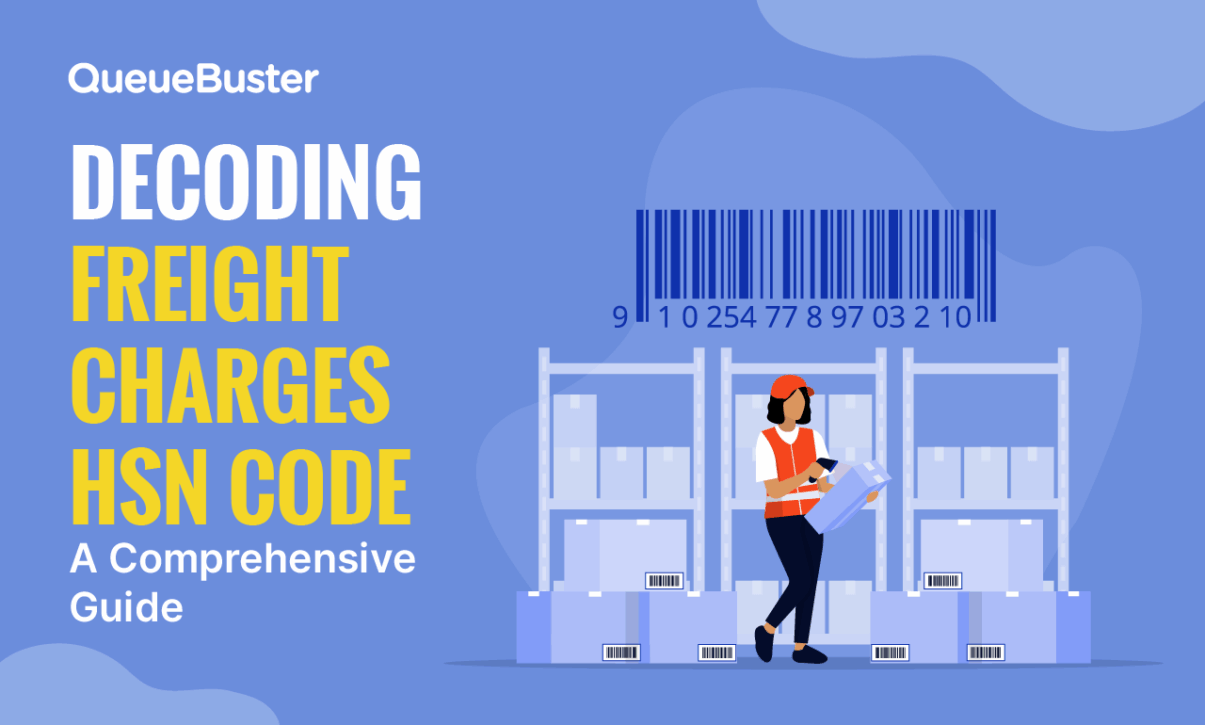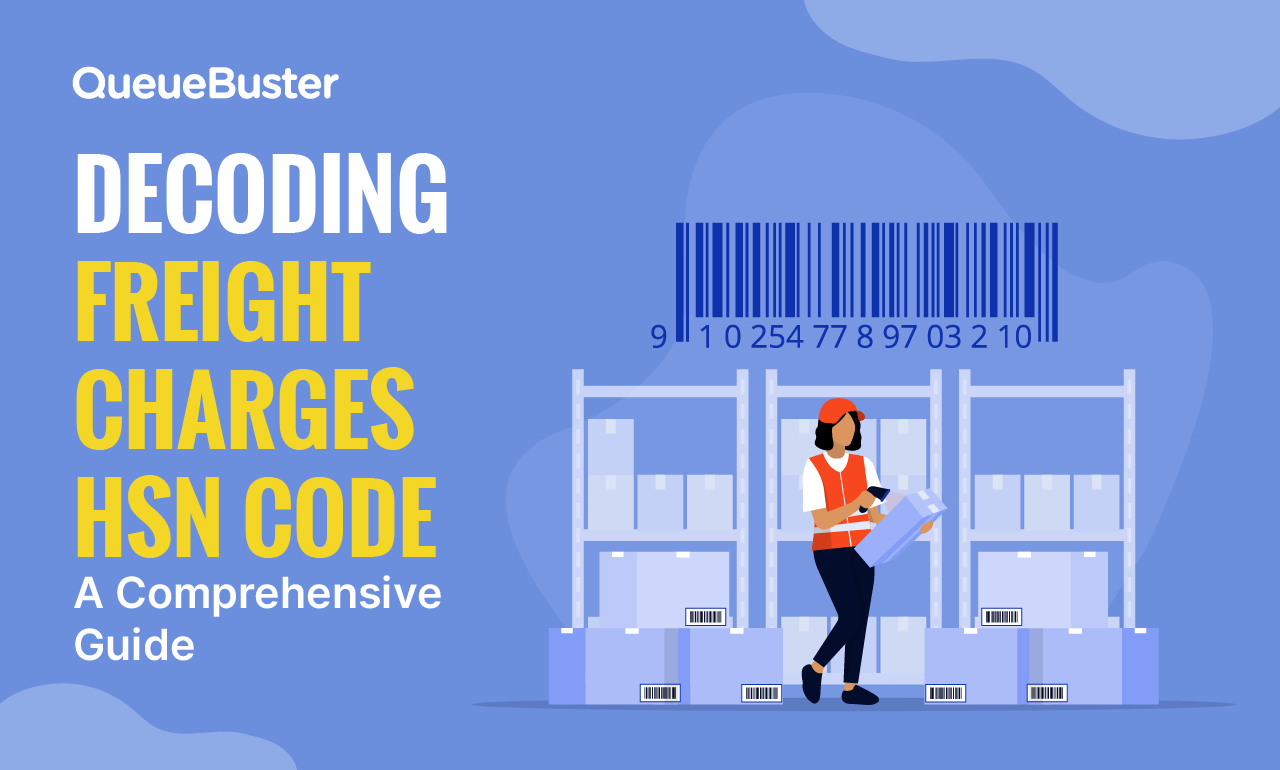
Decoding HSN Code For Freight Charges: A Comprehensive Guide
Decoding HSN Code For Freight Charges: A Comprehensive Guide

By Charu Gupta Published: April 16th, 2025
Freight Charges HSN Code
In the dynamic world of logistics and taxation, understanding the nuances of freight charges and their classification under the Goods and Services Tax (GST) regime is crucial for businesses. This guide aims to ease out the complexities surrounding freight charges, the HSN Code 9965, and their implications under GST in India as of 2025. Today, even POS billing software use this code to accurately classify and calculate GST on invoices.
Understanding Freight Charges
Freight charges refer to the costs incurred for transporting goods from one location to another. These charges can vary based on several factors, including the mode of transportation (road, rail, air, sea), distance, weight, and nature of the goods. In the context of GST, freight charges are considered a taxable supply of services, and their classification determines the applicable tax rate and compliance requirements.
What Do Freight Charges Include?
Freight charges are not limited to just the cost of transport. Here’s a closer look at what’s typically covered under freight charges:
- Base Transportation Fee
The actual cost incurred for moving goods by road, rail, air, sea, or pipeline. - Loading and Unloading Charges
Costs associated with labor and equipment used to load or unload the cargo. - Fuel Surcharge
An extra fee levied to compensate for fluctuations in fuel prices. - Handling Charges
Charges related to packaging, stacking, moving goods within a warehouse, or during transitions between modes of transport. - Toll and Entry Charges
Expenses like toll taxes or state entry fees that may be incurred during the transit. - Insurance Charges (if bundled)
If the freight provider covers the goods in transit under their insurance, the premium may be included. - Other Ancillary Services
This may include warehousing for brief durations, demurrage (charges for delays), or documentation fees.
When these components are bundled together and charged in a single invoice, GST is applied on the total freight value.
Freight HSN Code 9965: Classification of Freight Charges
The Harmonized System of Nomenclature – HSN code for freight charges is 9965, which pertains to goods transport services. This code is further subdivided to categorize different modes of transportation:
- 996511: Road transport services of goods, including live animals, household furniture, parcels, etc.
- 996512: Railway transport services of goods.
- 996513: Transport services of natural gas, petroleum, water, and other goods via pipeline.
- 996519: Other land transport services not elsewhere classified.
- 996521: Coastal and transoceanic water transport services of goods.
- 996522: Inland water transport services of goods.
- 996531: Air transport services for letters, parcels, and other goods.
- 996532: Space transport services for freight.
Each subcategory under HSN code 9965 has specific GST implications based on the nature of the service provided.
GST Rates Applicable To Freight Services
The GST rates under 9965 HSN code for freight charges vary depending on the mode of transportation and specific conditions:
- Road Transport (Goods Transport Agency – GTA):
- 5% GST: Applicable when the GTA does not avail input tax credit (ITC).
- 12% GST: Applicable when the GTA opts to pay GST on a forward charge basis and avails ITC.
- 5% GST: Applicable when the GTA does not avail input tax credit (ITC).
- Rail Transport: Generally attracts a 5% GST rate.
- Air Transport: Typically subject to 18% GST, applicable to both domestic and international cargo.
- Sea Transport: Ocean freight services are usually taxed at 5% GST under the reverse charge mechanism for import and export services.
- Pipeline Transport: Services involving the transportation of goods like natural gas or petroleum through pipelines are taxed at 5% GST.
It’s essential for businesses to determine the correct GST rate based on the specific freight service utilized to ensure compliance and accurate tax calculation.
What Is The Reverse Charge Mechanism in Freight Services?
Under the GST framework, the reverse charge mechanism shifts the responsibility of tax payment from the supplier to the recipient of the service. In the context of freight services:
1. Goods Transport Agency (GTA): When services are provided to specified entities such as registered factories, corporate bodies, or partnership firms, the recipient is liable to pay GST under RCM.
2. Input Tax Credit (ITC): Recipients paying GST under RCM can claim ITC, provided the goods or services are used for business purposes.
Understanding the applicability of RCM is vital for businesses to manage their tax liabilities effectively and maintain compliance.
What Are The Exemptions in Freight Services?
Certain freight services are exempt from GST to support essential sectors and reduce the tax burden on specific goods:
1. Agricultural Produce: Transportation of agricultural products is exempt to support the farming community.
2. Essential Commodities: Transport of milk, salt, food grains, and organic manure is exempt to ensure affordability.
3. Relief Materials: Transportation of relief materials for disaster victims is exempt to facilitate timely aid.
4. Defense Equipment: Transport of defense or military equipment is exempt to support national security operations.
5. Low-Value Consignments: Freight charges are exempt when the gross amount charged for a consignment transported in a single carriage is less than INR 1,500, or when the gross amount charged for transportation of all such goods for a single consignee does not exceed INR 750.
Businesses must be aware of these exemptions to avoid unnecessary tax payments and ensure proper documentation. This is where freight HSN code comes into effect.
Importance Of Accurate Freight HSN Code Classification
Accurate classification of freight services under the correct HSN code is critical for several reasons:
1. Compliance: Ensures adherence to GST regulations and avoids penalties.
2. Tax Calculation: Facilitates correct GST rate application and tax liability determination.
3. Input Tax Credit: Enables eligible businesses to claim ITC accurately.
4. Audit and Reporting: Simplifies audit processes and financial reporting by providing clear service categorization.
Misclassification can lead to compliance issues, financial discrepancies, and potential legal challenges.
Conclusion
Navigating the complexities of freight HSN code and their classification is essential for businesses operating in India’s logistics and supply chain sectors. By understanding the applicable GST rates, reverse charge mechanisms, exemptions, and the importance of accurate classification, businesses can ensure compliance, optimize tax liabilities, and maintain efficient operations using high-tech solutions like a compliant POS software.
For personalized advice and to stay updated with the latest GST regulations, consulting with a tax professional or referring to official GST resources is recommended.
Popular Posts

MEWA India 2026: Showcasing QueueBuster POS to the Global Dry Fruits Industry
MEWA India 2026 was not just another industry event for us, it […]

Why Merchants Must Accept Tap to Pay Payments by 2026
The way customers pay has changed rapidly over the last few years […]